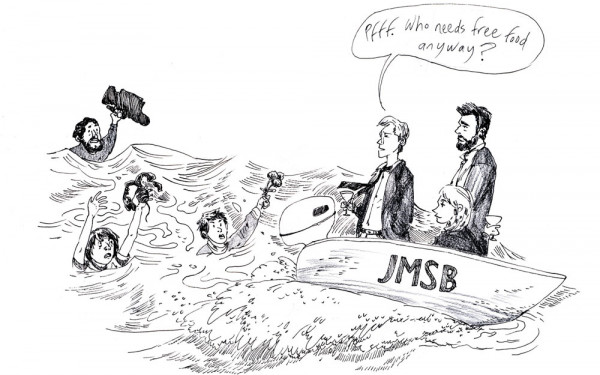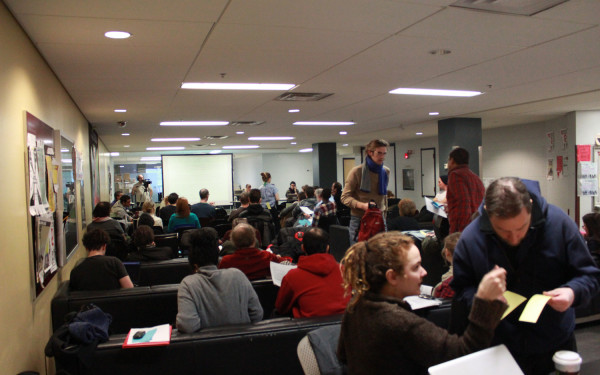New CUTV Has Big Plans
Reformed Station Seeking Fee Levy, Airtime on Cable TV
CUTV is back on its feet, with big dreams and reformed priorities.
“People do programming, not CUTV. Before it was like that,” said Chico Peres, one of two paid staff members at the station.
Community University Television—formerly Concordia University Television—is working to rebrand itself.
The station gained international fame for its on-the-ground live streaming of nightly demonstrations during the Maple Spring.
After the student movement quieted down, however, the station’s activities halted. Office locks were changed, and its fee levy account—how the station collects its per-credit fees from Concordia undergrads—was suspended.
A string of resignations left their Board of Directors without the legally required three members, and there were reports of staff controlling the station’s operations. It’s a history the new station is quickly trying to distance itself from.
“Anybody who wants to do something, they come here and learn how it’s done,” said Peres. “The training is mostly for us and them to make sure the equipment is not mishandled.”
The station is currently running two programs, What’s Up Montreal and Beyond the Film Festival, in addition to other one-off projects. A third program, I’m a Cleaner, is in development.
“It’s about the stereotypes of cleaners being undereducated people, it demystifies that,” said Peres.
A road documentary following “powwow step” sensation A Tribe Called Red is also in the works.
But with the station offering training and access to professional broadcast equipment, Peres is surprised they aren’t completely booked. Along with drafting essential policy, one of CUTV’s biggest challenges right now is getting the word out.
CUTV Board member and business student Baghdassar Balyan has enlisted the help of the John Molson Marketing Association to help solve this problem. Josh Swan from the JMMA suggested working with student groups to raise awareness about the station, and to better promote CUTV as a space where students can produce their own content.
When asked at the station’s latest Board meeting what students think of the station’s reputation, Swan replied, “Most students haven’t heard of you.”
To begin collecting a fee levy again, the station will need students to vote “yes” in a referendum during the Concordia Student Union general elections in March—yet another reason to get the word out.
The station is building upon the legal framework made at their Annual General Meeting on Sept. 30.
They now have a Board and bylaws—both legally required of Quebec not-for-profit corporations—and an audit has been completed of their current financial situation.
Accountant Nermin Kobas, who the station hired to compile the statement, said at the AGM that “there are a lot of unjustified accounting operations” by the station’s former management. At the time he was having trouble tracking down expenses, including an over-the-counter withdrawal of $17,900 cash.
The amount has since been identified as payment to LiveStream, which the station used to broadcast its coverage of the 2012 student strike. The statement also notes $411,724 in revenue—a combination of student fees and a huge influx in donations the station received during the Maple Spring.
Now that an initial statement has been made, a proper audit could be done at the end of the next financial year, said Kobas. The audit shows CUTV currently has an operating fund of $30,488.
A budget committee has been formed to plan future spending.
“Now we can decide where the money goes, instead of an executive decision [being made],” said CUTV Board member Justine Smith at their most recent Board meeting on Nov. 1.
Several working groups have been struck to make the station fully functional. In addition to budgeting, groups have been formed to work on policy, grievances and the possibility of getting on cable television. Two groups are also working towards CUTV’s hopes of a fee levy—focusing on events and marketing.
A priority of the policy committee is an ethics code and press pass policy.
“We’re lacking any kind of materials that have been approved by the membership about what kind of responsibilities need to be understood when taking out one of these press passes,” said staff member Fahim Moussi, adding that a code of conduct would be needed in such a policy.
A press pass policy draft was read at the station’s latest Board meeting, stating that reporters must act in a “professional and ethical manner” and wear “no political symbols.”
The draft was not passed, however, after CUTV Board Chair Emily Campbell pointed out there was no policy in place to guide what CUTV sees as ethical behaviour.
“CUTV has been embarrassed by really poor journalistic decisions,” said Campbell at Thursday’s meeting.
The station’s live coverage of the student strike often included editorialized commentary and yelling profanities at the police.
Campbell has been working with the English Language Arts Network to try and secure airtime for CUTV on MyTV, an English language community television station proposed by Quebec Internet and cable provider Vidéotron during its CRTC licence renewal earlier this year. The CRTC is expected to issue a ruling by January.
Campbell thinks the station should seize the opportunity, saying they could expect to be paid $1,000 an hour for four hours a week of cable content, based on other public access deals in Canada. It’s far from a done deal on either side however, the station having yet to decide if the arrangement is a good fit for CUTV.
“Maybe people will decide it’s not a good idea. But I think there are lots of people in the community who would be interested in creating programming to go on cable, especially if we could offer some kind of bursary or honorarium,” said Campbell.
Dreams of cable access are nothing new for the station.
“CUTV has been thinking about this before, even when Laith [Marouf] and Laura [Kneale] were in charge,” Campbell continued.
“Initially they had the idea that CUTV would start the English community television station themselves.”
However the idea of working with a large media corporation didn’t sit well with some of those present at the latest meeting.
“My main concern is that CUTV is an independent organization,” said CUTV student member Anne-Myriam Abdelkah. [I don’t want] Vidéotron coming from the top.”
To get involved in CUTV, visit their office weekdays from 10 a.m. to 6 p.m. at 2110 Mackay St., room 403.

_900_597_90.jpg)


_edited_600_375_90_s_c1.JPG)


_600_375_90_s_c1.jpg)